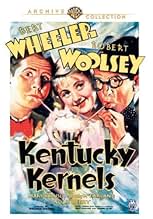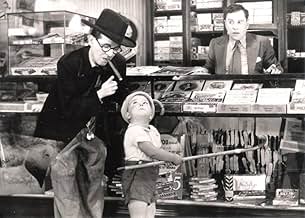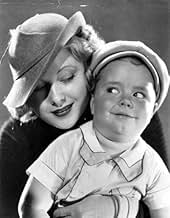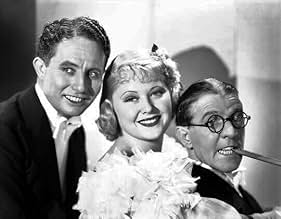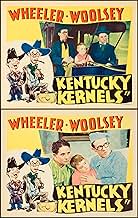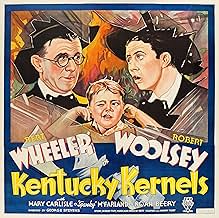Dos magos desempleados ayudan a Jerry a adoptar a Spanky. Jerry se fuga y les deja al niño. Spanky hereda una fortuna, van a Kentucky y quedan atrapados entre familias rivales.Dos magos desempleados ayudan a Jerry a adoptar a Spanky. Jerry se fuga y les deja al niño. Spanky hereda una fortuna, van a Kentucky y quedan atrapados entre familias rivales.Dos magos desempleados ayudan a Jerry a adoptar a Spanky. Jerry se fuga y les deja al niño. Spanky hereda una fortuna, van a Kentucky y quedan atrapados entre familias rivales.
- Dirección
- Guionistas
- Elenco
George 'Spanky' McFarland
- Spanky Milford
- (as 'Spanky' McFarland)
Lucille La Verne
- Aunt Hannah Milfor
- (as Lucille LaVerne)
Willie Best
- Buckshot
- (as Sleep 'n' Eat)
Harry Bernard
- Destitute Man
- (sin créditos)
Edgar Dearing
- Policeman
- (sin créditos)
Jack A. Goodrich
- Double
- (sin créditos)
William Gould
- One of the Milfords
- (sin créditos)
Dorothy Granger
- Ethel - Baxter's Secretary
- (sin créditos)
Opiniones destacadas
Bert Wheeler and Robert Woolsey get themselves stuck with little Spanky McFarland. They're a couple of itinerant magicians and the last thing they need is a kid. But this might be a pot of gold because Spanky just could be the heir of the Milford estate in Kentucky.
But what the boys don't know is that in passing themselves off as Milfords as well, they're inheriting an old mountain feud with another clan called the Wakefields. Made even worse by the fact that poor Bert has fallen for Mary Carlisle the daughter of Wakefield family patriarch Noah Beery, Sr.
The boys are pretty resourceful though and the last twenty minutes or so with them, Willie Best and Spanky holding off a horde of Wakefields is pretty funny. Sad to say though that Willie Best's portrayal of Buckshot probably keeps Kentucky Kernels from having been shown too much on television for years.
Although Kentucky Kernels is funny, I'd see Abbott&Costello's Comin' Round the Mountain. A similar story without the racism.
But what the boys don't know is that in passing themselves off as Milfords as well, they're inheriting an old mountain feud with another clan called the Wakefields. Made even worse by the fact that poor Bert has fallen for Mary Carlisle the daughter of Wakefield family patriarch Noah Beery, Sr.
The boys are pretty resourceful though and the last twenty minutes or so with them, Willie Best and Spanky holding off a horde of Wakefields is pretty funny. Sad to say though that Willie Best's portrayal of Buckshot probably keeps Kentucky Kernels from having been shown too much on television for years.
Although Kentucky Kernels is funny, I'd see Abbott&Costello's Comin' Round the Mountain. A similar story without the racism.
If you only know the little bruiser Spanky McFarland from his Litlte Rascals, this movie casts some light on why he was considered one of the best child actors of his generation. As an adorable little tyke with a penchant for breaking glass, he drives the movie's Kentucky feud storyline. He even signs a love song "One Little Kiss," to his best pal -- a cute dog, and one of the male leads sings a few lines to a donkey (It's that kind of movie).
Kentucky Kernels is notable for showing what was considered funny -- and in some cases, socially acceptable -- in 1934. An actor credited as "Sleep n Eat" (actually Willie Best) shuffles his way through the film as a stereotypical wide-eyed, scared-of-his-shadow servant. And a gay subtext between the two male leads is watered down by some forced and unconvincing romance with a typical blonde Southern belle, but lots of the movie's humor is derived from the male/male "romance." In their first scene, for example, Bert Wheeler and Robert Woolsey are the picture of domestic bliss -- bickering as one sits at the dinner table while the other does dishes and complains about his dishpan hands. Though they mince their ways through the rest of the movie, even holding hands at times, the characters are presented as heterosexual. At another point, they're shown sleeping in the same bed -- in a plantation mansion that surely had plenty of bedrooms.
The plot, with the boys finding themselves in the middle of a Hatfileds and McCoys-style Kentucy feud, is a bit contrived. Lines like "You dance exactly like a heifer -- I mean a zephyr!" seem lifted from the Marx Brothers, and in fact one of the supporting players is best known for her appearances as the straight woman in some Marx classics. Margaret Dumont plays the manager of an adoption agency that places young Spanky, indirectly, in the care of the vaudeville performers played by Wheeler and Woolsey. It's a shame Dumont wasn't given a more substantial part; she would have been terrific as a befuddled Southern matriarch later in the film.
The paper-thin plot won't really hold your attention, but viewed as a "film history" lesson, it's worth watching. Director George Stevens went on to much bigger and better things (including the enormous classic, Giant, also set in the South), so it's interesting to see how he handled this dull script.
Kentucky Kernels is notable for showing what was considered funny -- and in some cases, socially acceptable -- in 1934. An actor credited as "Sleep n Eat" (actually Willie Best) shuffles his way through the film as a stereotypical wide-eyed, scared-of-his-shadow servant. And a gay subtext between the two male leads is watered down by some forced and unconvincing romance with a typical blonde Southern belle, but lots of the movie's humor is derived from the male/male "romance." In their first scene, for example, Bert Wheeler and Robert Woolsey are the picture of domestic bliss -- bickering as one sits at the dinner table while the other does dishes and complains about his dishpan hands. Though they mince their ways through the rest of the movie, even holding hands at times, the characters are presented as heterosexual. At another point, they're shown sleeping in the same bed -- in a plantation mansion that surely had plenty of bedrooms.
The plot, with the boys finding themselves in the middle of a Hatfileds and McCoys-style Kentucy feud, is a bit contrived. Lines like "You dance exactly like a heifer -- I mean a zephyr!" seem lifted from the Marx Brothers, and in fact one of the supporting players is best known for her appearances as the straight woman in some Marx classics. Margaret Dumont plays the manager of an adoption agency that places young Spanky, indirectly, in the care of the vaudeville performers played by Wheeler and Woolsey. It's a shame Dumont wasn't given a more substantial part; she would have been terrific as a befuddled Southern matriarch later in the film.
The paper-thin plot won't really hold your attention, but viewed as a "film history" lesson, it's worth watching. Director George Stevens went on to much bigger and better things (including the enormous classic, Giant, also set in the South), so it's interesting to see how he handled this dull script.
Always enjoy Wheeler & Woolsey, even if their movie output is uneven; some are very funny, some are not so. I thought this one was pretty funny and that it succeeds due to the professional direction of George Stevens.
It is old-fashioned in that much of the humor consists of what must be old corny vaudeville jokes, sight gags and outrageous puns, all of which might not go over with today's audiences. Speaking for myself I can appreciate such antiquated antics, and I can also put into context outdated racial humor, such as found here in Willie Best's character. He plays his usual slow-talking, pop-eyed servant ("feets, do yo' duty!") by which he became famous.
Spanky McFarland was always a cute little kid and doesn't disappoint here. And this maybe the only time Noah Beery,Sr. sings on screen, and takes a turn along with everybody else singing a Kalmar-Ruby song "One Little Kiss", a very tuneful number written for this picture. Some reviewers take issue with the inane plot, about two feuding Kentucky families, but c'mon, folks. It's just a Wheeler & Woolsey comedy; were you expecting Ingmar Bergman?
It is old-fashioned in that much of the humor consists of what must be old corny vaudeville jokes, sight gags and outrageous puns, all of which might not go over with today's audiences. Speaking for myself I can appreciate such antiquated antics, and I can also put into context outdated racial humor, such as found here in Willie Best's character. He plays his usual slow-talking, pop-eyed servant ("feets, do yo' duty!") by which he became famous.
Spanky McFarland was always a cute little kid and doesn't disappoint here. And this maybe the only time Noah Beery,Sr. sings on screen, and takes a turn along with everybody else singing a Kalmar-Ruby song "One Little Kiss", a very tuneful number written for this picture. Some reviewers take issue with the inane plot, about two feuding Kentucky families, but c'mon, folks. It's just a Wheeler & Woolsey comedy; were you expecting Ingmar Bergman?
Kentucky Kernels (1934)
*** (out of 4)
George Stevens directs this Wheeler and Woolsey film where the two take an adopted boy (Spanky from Our Gang) back to his relatives in Kentucky but soon finds themselves in a feud between two families. It's been hit and miss with me and these W&W films but this one here is clearly the best I've seen. The comedy ranges towards jokes about rednecks and some rather politically incorrect stuff but the duo brings some great comic timing and the added bonus of Spanky makes this a damn good comedy. There's some wonderful gags including a horse accidentally drinking moonshine and another scene where W&W try and talk themselves out of a speeding ticket. The jokes aimed at the Southern families work very well and Spanky steals the show with each scene that he's in. The running joke is that he likes to break windows so there's plenty of that going on. There's also a large shoot out at the end, which looks to have more bullets flying than any of Warner's gangster pictures. The film borrows a lot of Keaton's Our Hospitality but works well on its own.
*** (out of 4)
George Stevens directs this Wheeler and Woolsey film where the two take an adopted boy (Spanky from Our Gang) back to his relatives in Kentucky but soon finds themselves in a feud between two families. It's been hit and miss with me and these W&W films but this one here is clearly the best I've seen. The comedy ranges towards jokes about rednecks and some rather politically incorrect stuff but the duo brings some great comic timing and the added bonus of Spanky makes this a damn good comedy. There's some wonderful gags including a horse accidentally drinking moonshine and another scene where W&W try and talk themselves out of a speeding ticket. The jokes aimed at the Southern families work very well and Spanky steals the show with each scene that he's in. The running joke is that he likes to break windows so there's plenty of that going on. There's also a large shoot out at the end, which looks to have more bullets flying than any of Warner's gangster pictures. The film borrows a lot of Keaton's Our Hospitality but works well on its own.
Any enjoyment you get from KENTUCKY KERNELS will depend on whether or not you can view the film in the context of its time and accept all of the foolishness with that in mind. Otherwise, it's not a particularly rewarding way to view Wheeler and Woolsey. Surely, their reputation was based on better material than this.
The thin plot has the boys adopting SPANKY McFARLAND from an orphanage run by MARGARET DUMONT. He's a cute little bundle but has a penchant for breaking glass at every opportunity--and the script gives him plenty of excuses. Unfortunately, most of the gags are the kind of one-liners that must have killed vaudeville, delivered in brisk style but corny nevertheless.
LUCILLE LaVERNE shows up as an old dowager (she was the voice for The Wicked Queen in Disney's "Snow White"), and MARY CARLISLE is the love interest for one of the boys. The politically correct will be insulted by the WILLIE BEST racial humor in scenes where the boys go south.
Strictly a product of its time, ending in a skirmish between a Hatfield and McCoy type of family feud.
The thin plot has the boys adopting SPANKY McFARLAND from an orphanage run by MARGARET DUMONT. He's a cute little bundle but has a penchant for breaking glass at every opportunity--and the script gives him plenty of excuses. Unfortunately, most of the gags are the kind of one-liners that must have killed vaudeville, delivered in brisk style but corny nevertheless.
LUCILLE LaVERNE shows up as an old dowager (she was the voice for The Wicked Queen in Disney's "Snow White"), and MARY CARLISLE is the love interest for one of the boys. The politically correct will be insulted by the WILLIE BEST racial humor in scenes where the boys go south.
Strictly a product of its time, ending in a skirmish between a Hatfield and McCoy type of family feud.
¿Sabías que…?
- Trivia"RKO" borrowed George 'Spanky' McFarland from "Hal Roach Studios" for this film.
- ConexionesFeatured in Hollywood the Golden Years: The RKO Story: Birth of a Titan (1987)
- Bandas sonorasOne Little Kiss
(1934) (uncredited)
Written by Bert Kalmar, Harry Ruby
Performed by Bert Wheeler, Noah Beery, George 'Spanky' McFarland,
Robert Woolsey, Mary Carlisle and negro servants
Selecciones populares
Inicia sesión para calificar y agrega a la lista de videos para obtener recomendaciones personalizadas
Detalles
- Fecha de lanzamiento
- País de origen
- Idioma
- También se conoce como
- Kentucky Corn
- Locaciones de filmación
- Productora
- Ver más créditos de la compañía en IMDbPro
- Tiempo de ejecución1 hora 15 minutos
- Color
- Relación de aspecto
- 1.37 : 1
Contribuir a esta página
Sugiere una edición o agrega el contenido que falta

